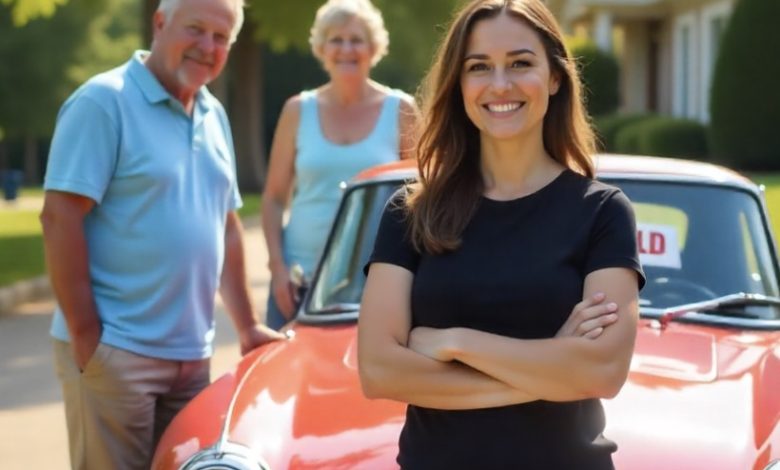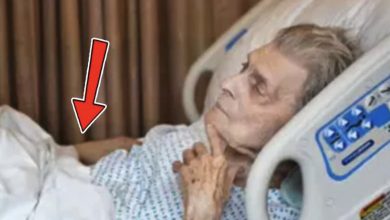During my trip for business, my parents went behind my back and sold my beloved sports car to cover the cost of my sister’s holiday.

My name is Vanessa, I’m 28 years old, and ever since I was a little girl, I have loved cars. Not just any cars, but the classics, especially Corvettes. I used to spend hours with my grandfather in his garage, learning the difference between spark plugs and carburetors, my small hands covered in grease while other kids were watching cartoons. My grandfather always told me, “Vanessa, cars aren’t just machines. They carry memories. They carry pieces of us.” His words stayed with me, and every time I saw his prized 1969 Corvette Stingray in Rally Red, I promised myself that one day I would have one just like it.
My parents never really understood my passion. To them, my interest was “unfeminine,” a strange obsession that made no sense. My younger sister Heather was their pride and joy. She was delicate, charming, into everything they considered “proper” for a girl—dance lessons, fashion, social events. When she asked for something, she always got it: the best instructors, designer clothes, even a brand-new car for her graduation. When I asked for auto shop classes, they said it was too expensive. When I needed financial help for college, they told me to figure it out alone. The favoritism was constant, and while I didn’t hate Heather for it, it left me with a dull ache I carried for years.
I learned quickly that if I wanted something in life, I had to earn it on my own. I worked three jobs during college, juggling waitressing, tutoring, and late-night shifts at a library while studying finance. My friends partied on weekends; I saved every penny I could. After graduation, I got a job at an investment bank. The work was brutal—70-hour weeks, endless nights, constant pressure—but the salary was good. Every month, I put money into what I called my “Corvette Fund.” I lived frugally, skipped vacations, and ignored the temptation of luxuries. After five years of this sacrifice, I finally bought her: a 1969 Corvette Stingray in Rally Red, just like Grandpa’s.
Driving that car home was one of the best moments of my life. I felt like my grandfather was with me, proud, his spirit sitting silently in the passenger seat. That car wasn’t just a purchase. It was a symbol of independence, a link to my past, and a reward for everything I had worked for. My boyfriend, James, understood completely. We had met at a car show—he owned a replica Stingray, and we bonded instantly over our shared love of classic cars. He respected my passion, the long hours I put into restoring small details, the way I treated that Corvette as something sacred. For two years, that car was my pride and joy.
Everything changed when my boss called me into her office one Tuesday. “Vanessa,” she said, “we need you in Tokyo. You’ll be leading the presentation team for Patterson Financial. This could be huge for your career.” I was thrilled, but it meant being away for three weeks. The thought of leaving my Corvette unattended worried me, especially since my neighborhood had seen a string of car break-ins. I decided the safest place for it was at my parents’ house.
The day before my flight, I drove it there. My dad helped me park it in their garage, and I gave him strict instructions: start it once a week, let it run for fifteen minutes, but never drive it and never let anyone else near it. He looked a little offended, but I didn’t care. James and I also had a backup plan. Since his replica looked almost identical, he promised to swap the cars after I left. That way, my real Corvette would be safe, and no one would know the difference. Confident everything was secure, I flew to Tokyo.
The trip was a huge success. My team closed a $12 million deal, and my boss hinted that a Vice President promotion could be coming my way. I returned to Chicago feeling unstoppable. But the moment my taxi pulled into my parents’ driveway, my chest tightened. The garage was empty. My Corvette—or James’s replica—was gone.
I walked inside, my voice trembling. “Where is my car?”
My mother’s face shifted into a look I knew too well, the kind that meant she was hiding something. My dad avoided my eyes. My mom crossed her arms and said proudly, “Heather had an opportunity she couldn’t miss. Thanks to your car, she’s having the time of her life.” She pulled out her phone and showed me a picture: Heather, lounging on a cruise ship in the Mediterranean, cocktail in hand, smiling like she didn’t have a care in the world.
My stomach dropped. “You sold my car,” I whispered, too stunned to raise my voice.
“You can always buy another one,” Mom said with a wave of her hand. “You make good money. Heather needed this. She’s been so stressed at work, and this trip was once-in-a-lifetime.”
The words sliced through me. “Do you have any idea what that car meant to me? That was my connection to Grandpa. It was years of sacrifice, of hard work.” My voice cracked.
“It’s just a car,” she snapped. “Family comes first. You’ve always been strong. Heather is the one who needs help.”
I felt my breath catch in my chest. “So my feelings, my hard work, my property—none of that matters? Only Heather does?”
“How much did you sell it for?” I demanded.
My dad muttered, “Fifty thousand.”
I gasped. “Fifty? That car was worth eighty-five! Did you even bother checking?”
The betrayal burned so deeply that I couldn’t even speak for a moment. And then, suddenly, my phone buzzed. It was James: Just pulled up. Where’s the Stingray?
I laughed. The sound was sharp, almost hysterical, and my mother’s face twisted in confusion. “What’s so funny?” she barked.
I lifted my head, smiling slowly. “You sold the wrong car. That wasn’t mine. That was James’s replica.”
Their faces drained of color. My father stammered, “But… it looked exactly like yours.”
“That was the point,” James said as he walked in. “Mine is a replica from 2004. Vanessa’s is the authentic 1969 Stingray. What you sold wasn’t hers—it was mine. And you didn’t just sell it. You forged documents and handed it over without my consent.”
My mother’s knees buckled, and she dropped into a chair. “Oh my God,” she whispered. “What have we done?”
“You’ve committed fraud,” I said coldly. “Auto theft worth over $20,000 is a Class 1 felony in Illinois. That’s up to fifteen years in prison.”
My parents’ faces twisted in horror. For once, their usual manipulative tears and excuses didn’t work on me. Right on cue, my phone rang. It was the buyer. “This is Peter Donovan,” he said. “I purchased a 1969 Corvette Stingray from your parents. There’s a problem with the title. Can we talk?”
I hung up and looked at my parents. “You didn’t just betray me. You dragged a stranger into this mess. You could go to jail.”
Panic spread across their faces. My mother begged, “Please, Vanessa, we never meant to hurt anyone.”
“Except me,” I replied bitterly.
James and I arranged to meet Peter Donovan the next day. He was furious, but after we explained the situation, we promised him a full refund of the $50,000 plus $5,000 extra for the trouble. That meant my parents had to come up with $55,000 fast. They tried to plead poverty, but James was firm: either they paid or faced charges.
In the end, they took out a $40,000 loan against their house, Heather returned from her trip early and gave $10,000 from her savings, and my mother sold some of her jewelry to cover the rest. James also demanded a notarized apology stating they would never interfere with our property again.
The family meeting where we finalized this was tense. Heather threw a tantrum, claiming it wasn’t fair. “Why am I being punished?” she cried. “You’ve always been jealous because Mom and Dad love me more!” The room fell silent. Even my parents looked stunned by her outburst.
I spoke quietly. “You’re twenty-four, Heather. You can’t stand on your own two feet because Mom and Dad coddled you. That’s not love—it’s enabling.”
For the first time, my father admitted I was right. Something shifted in that moment.
The money was returned, the car was safe, and the apology was signed. The crisis was over, but the emotional wounds lingered. Over time, though, small changes appeared. My father asked if I could teach him how to restore an old truck. My mother gave James a framed copy of the car’s title as a peace offering. Heather got a job and began, for the first time, to stand on her own.
Forgiveness didn’t come instantly, but slowly, the pain began to heal. That Corvette had been more than a car—it became the turning point that forced my family to face the truth about our unhealthy patterns. By standing up for myself, I didn’t lose my family. I taught them, and myself, what respect really means.
And that lesson was worth more than any car could ever be.










